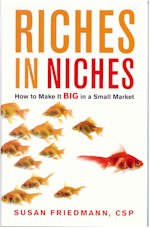 |
|
|
| ||||||
|
|
This page is the original source of this review, though you may also find it on Amazon or other sites. | ||
| Book Reviews Home | Free Audio Books | |
 |
Book Review of: Riches in NichesHow to make it big in a small market Price: $14.99 Availability: Usually ships
within 24 hours |
| Review
of
Riches In Niches, by Susan Friedmann (Hardcover, 2007) (You can print this review in landscape mode, if you want a hardcopy) Reviewer: Mark Lamendola, author of over 6,000 articles. Friedmann has several good articles posted in the Mindconnection online library, so I was interested in reading her book. When I was quite young, I excitedly told a mentor about several new things I was doing. His advice to me was to pick one and do it well. Since then, I have seen the wisdom of that advice proven time and time again. It is better to do one thing well than to do many things poorly. That philosophy is the underpinning of this book. But it's not a rah-rah book that spends a couple hundred pages making the same point over and over. You've probably read such books. Whenever I have finished such a book, I wonder if the author has ever really put the advice to use. There's no "how to get there from here." Riches In Niches lays out a 7-step plan anyone can follow, plus it provides a ton of useful references. Throughout the book, you'll find short case histories that each illustrate a point. The first chapter introduces us to the author. We learn why Friedmann chose the path she did, and we get to learn from her mistakes. The next chapter provides a detailed explanation of why it's better to pick a specialty than to try to be all things.
Chapters Three and Four lay the foundation for understanding how niches work. The next seven chapters (Five through Eleven) provide Friedman's seven-step plan. Chapter Twelve ties it all together and provides some additional insights. In the back is an extensive "Recommended Resources" section that, in itself, justifies buying the book. Friedmann writes in a style that reminds me of a transcript of a public speech. This should not be surprising, as she is an accomplished public speaker and is, in fact, a National Board Director of the National Speakers Association. Grammarians will give her a few red marks here and there, but those little errors don't seem to slow the book down. I think they just serve to illustrate one of the points Friedmann made in her book. Don't let perfectionism stand in the way of excellence and accomplishment. For many entrepreneurs, this is a nearly insurmountable barrier. It's the number one reason small firms tend to stay small. You'll find other pearls of wisdom, plus practical advice on how to implement them, in this book. If you're already a niche player, that's great. You may find you can improve your game after reading this book. The same goes for someone who's an employee in a corporation. Don't be a commodity. Command an image of high value, instead, and reap the rewards. | |
About these reviewsYou may be wondering why the reviews here are any different from the hundreds of "reviews" posted online. Notice the quotation marks? I've been reviewing books for sites like Amazon for many years now, and it dismays me that Amazon found it necessary to post a minimum word count for reviews. It further dismays me that it's only 20 words. If that's all you have to say about a book, why bother? And why waste everyone else's time with such drivel? As a reader of such reviews, I feel like I am being told that I do not matter. The flippancy of people who write these terse "reviews" is insulting to the authors also, I would suspect. This sound bite blathering taking the place of any actual communication is increasingly a problem in our mindless, blog-posting Webosphere. Sadly, Google rewards such pointlessness as "content" so we just get more if this inanity. My reviews, contrary to current (non) standards, actually tell you about the book. I always got an "A" on a book review I did as a kid (that's how I remember it anyhow, and it's my story so I'm sticking to it). A book review contains certain elements and has a logical structure. It informs the reader about the book. A book review may also tell the reader whether the reviewer liked it, but revealing a reviewer's personal taste is not necessary for an informative book review. About your reviewer
About reading styleNo, I do not "speed read" through these. That said, I do read at a fast rate. But, in contrast to speed reading, I read everything when I read a book for review. Speed reading is a specialized type of reading that requires skipping text as you go. Using this technique, I've been able to consistently "max out" a speed reading machine at 2080 words per minute with 80% comprehension. This method is great if you are out to show how fast you can read. But I didn't use it in graduate school and I don't use it now. I think it takes the joy out of reading, and that pleasure is a big part of why I read. |
| |||||